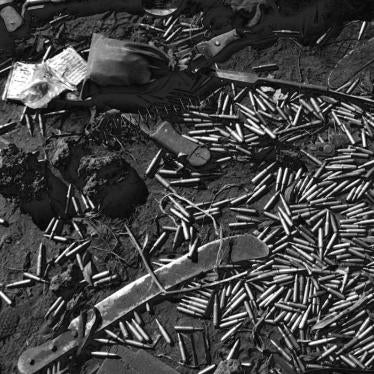(New York) — Human Rights Watch today deplored prosecutorial incompetence at the International Criminal Tribunal for Rwanda (ICTR) which resulted in the release of a leading suspect charged with organizing the 1994 genocide in Rwanda. The Appeals Court of the ICTR freed Jean-Bosco Barayagwiza because the prosecutor's office had failed to inform him of charges against him, had not insisted on his prompt transfer from a jail in Cameroon, and had not presented him before the ICTR within the specified time period. The Appeals Court ordered Barayagwiza returned to Cameroon where he had spent nineteen months in detention.
"This decision should jolt the prosecutor's office and the international community in general, reminding everyone of the need for prompt and exemplary justice. When the ICTR was set up, international actors contributed great rhetoric but little money," stated Alison Des Forges, the Rwandan specialist at Human Rights Watch. "The early bumblings and delays of the poorly funded prosecutor's office have led to a decision that distresses but should not surprise us."
In May 1994 Human Rights Watch initiated the first judicial proceeding related to the genocide which ultimately killed at least a half a million persons. While the killing campaign was still underway, Human Rights Watch brought a suit against Barayagwiza, who was then in New York to plead the cause of the genocidal government before the U.N. Security Council. In an April 1996 decision of the case, Judge John Martin of the U.S. District Court, Southern District found that Barayagwiza "engaged in conduct so inhuman that it is difficult to conceive of any civil remedy which can begin to compensate the plaintiffs for their loss or adequately express society's outrage at the defendant's actions." Martin awarded them $105 million in damages and declared, "This Judge has seen no other case in which monetary damages were so inadequate to compensate the plaintiffs for the injuries caused by a defendant."
Barayagwiza, then director of political affairs at the Rwandan Ministry of Foreign Affairs, headed the Coalition for the Defense of the Republic, a political party known for its virulence against Tutsi. He also helped found Radio Télévision Libre des Mille Collines (RTLM), which incited to genocide and which broadcast specific directives on how to find and kill Tutsi once the genocide was launched.
The release by the Appeals Court on procedural grounds closes the case against him in the ICTR. Barayagwiza remains subject to prosecution by national courts, such as those of Cameroon, where he was first arrested, or of Rwanda. The Appeals Court directed that he be returned to Cameroon but cannot order his prosecution there.
Cameroon could extradite Barayagwiza for trial in Rwanda where he would face the death penalty if convicted. Rwandan courts are overwhelmed with a backlog of more than 125,000 cases of genocide suspects, some of whom have spent five years in detention without trial.
"The guilty must be tried and punished in order to break the impunity that has spurred violence in central Africa," Des Forges continued. "If the ICTR cannot do so, national courts—in this case, those of Cameroon—must take up the burden and other governments must be ready to help them with funds and personnel."







